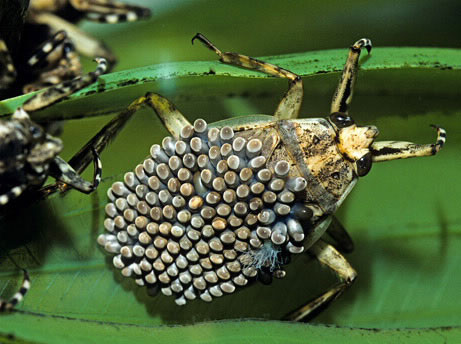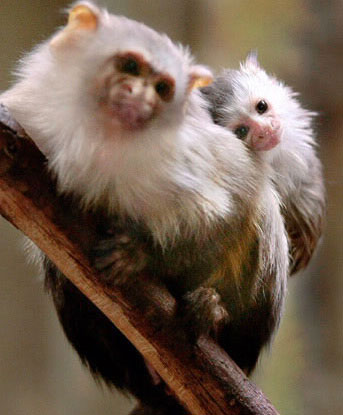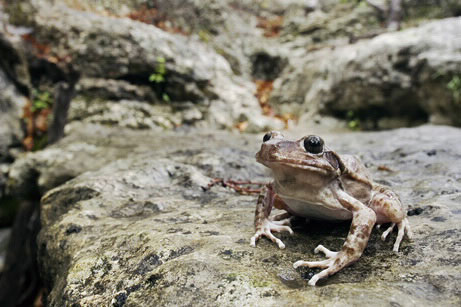The most devoted fathers in the biological world
Stories about the fathers of animals with great dedication to children are always interesting stories.
Top of the table is the seahorse father, a pregnant father. The mother seahorse is lazy, pushing the pregnancy for her husband by laying in the bag where the belly of the seahorse proclaims about 2,000 eggs. The 'seahorse' of seahorses from 10 to 25 days will hatch. The hatched baby seahorse knows how to find its own food and is well cared for by seahorses until it is independent.

The beetle is also a respectable father. There are no egg bags like seahorses, they wear eggs on their backs. After ' eating ' together, the female beetle lays out about 150 eggs and secretes a binder that attaches the eggs to her husband's back. The duckweed carries these eggs for 3 weeks, trying to avoid the enemies to protect the eggs. Occasionally, it also floats on the sun-heated surface so that the moss will damage the eggs that cannot grow.

The squirrel-tailed monkeys in South America are great fathers, always piggybacking, raising their children, grooming their children and teaching them how to climb and find food to adulthood. It was even a " midwife " when she gave birth, welcomed the new baby monkey, stroked and licked her hair very cleanly, because the birth of mother monkey was very difficult. Imagine: the mother monkey weighs only about 55kg and the newborn baby monkey weighs 14kg. This monkey lives in a monogamous life mode.

The frog barking male living in the southeastern United States - so called because its cries sounded like a barking dog - taking care of and protecting the female frog eggs born under very long rocks or logs. center. It lies weekly next to the egg nest, watering the solution continuously to prevent it from drying out. When the tadpoles hatch, barking frogs always come and open their wide mouths of tadpoles to swim massively when they are in danger.

Hateful cockroaches are admirable fathers in sacrifice for their children. The type of wood-eating cockroaches knows how to use wood pulp to make a nest and find food for the larvae. What is special is that they know how to track down bird droppings, containing the protein they need for their 'growth' to bring them to eat.
Wood cockroaches are also neat parents, always clean the nest from mushrooms and dead cockroaches to avoid infection.

In most birds, mothers take care of their children, except the South American eagle.
During mating season, the eagles ' walk ' with many different empty eagles and then seek to lay eggs in a common nest built by an empty eagle. This empty eagle hatches up to 50 eggs in 6 weeks and takes care of the hatched eagles. At that time, other empty eagles came to take care of their children, not allowing anyone to approach, including mother eagles.

The penguins live, feed and incubate eggs at temperatures below zero. After the penguin roof lays a single egg, assign it to her husband. The penguin drum placed the egg between its legs and covered it with a thick and discreet skin flap to maintain a certain temperature. It kept eggs for 4 months and hardly moved. Meanwhile, the penguins roof into the sea to find their prey and return to bring food back at the time of the hatching.

- Great fathers in the animal world
- The best fathers in the world
- 10 most devoted fathers on the planet
- The biological clock impacts the opportunity to be a father
- The mother has a child at the same time as ... two fathers
- Developed the world's first artificial biological retina
- The old father is easy to die soon
- Mother's behavior is the key to her father's care for children
- Detecting the biological clock 'adjustment button' of the human body
- How were biological weapons born?
- Research three-dimensional biological printers producing kidneys
- She has enough DNA from three biological parents
 The 11 most unique public toilets in the world
The 11 most unique public toilets in the world Explore the ghost town in Namibia
Explore the ghost town in Namibia Rare historical moments are 'colored', giving us a clearer view of the past
Rare historical moments are 'colored', giving us a clearer view of the past The world famous ghost ship
The world famous ghost ship Strange creature eggs appear at a depth of 6,200m in the Pacific Ocean
Strange creature eggs appear at a depth of 6,200m in the Pacific Ocean  The most unique dish in Mexico, found nowhere else, only the brave dare to try
The most unique dish in Mexico, found nowhere else, only the brave dare to try  You may not know: The elephant bird egg is the largest bird egg in history.
You may not know: The elephant bird egg is the largest bird egg in history.  Explore the Mass Incubators of Ancient Egypt
Explore the Mass Incubators of Ancient Egypt  46 million people shocked to find out what this is on the beach
46 million people shocked to find out what this is on the beach  Tigers don't eat their cubs, but why do these 5 species?
Tigers don't eat their cubs, but why do these 5 species? 